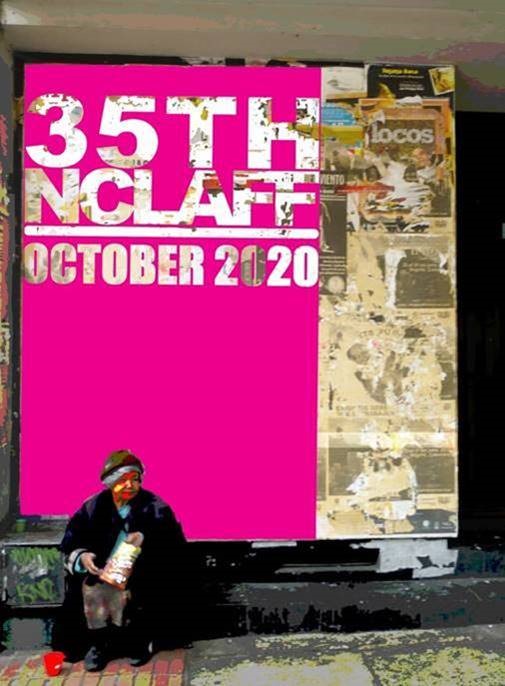NCLAFF Conversations | A mini Web Conference: Latin American and Caribbean Film in the Era of Neoliberalism (1985-2020)
Date: October 9, 2020 - October 10, 2020
Time: 4:00- 5:30pm
The 2020 NCLAFF celebrates the festival’s 35th anniversary with an innovative format, a virtual synchronic model. We will start with NCLAFF Conversations | A mini Web Conference: Latin American and Caribbean Film in the Era of Neoliberalism (1985-2020) on October 9 and 10, 2020. We will follow with ten days (October 9 to 18), of screenings/streaming. The films were selected from the hundreds of films shown during the past 35 years of the NCLAFF.
Latin American and Caribbean Film in the Era of Neoliberalism (1985-2020)
This web-seminar is divided in three headings: Globalizing Latin American Cinema; Indigenous, Afro, and other Cinemas; and Teaching Latin American Cinema, giving an overall review on Latin American and Caribbean film production in the past three and a half decades.
Globalizing Latin American Cinema
Sophia A. McClennen | Professor of International Affairs and Comparative Literature.
Pennsylvania State University.
Dr. McClennen is a professor of international affairs and comparative literature and the founding director of Penn State's Center for Global Studies, a Title VI FLAS Center, and has ties to the departments of Spanish and Women's Studies. She has published eleven books and has two in process. Her most recent monograph is Globalization and Latin American Cinema: Toward a New Critical Paradigm (Palgrave 2018). Sophia is a Duke Ph.D. (1995) who worked closely with the Latin American Film Festival while a student at Duke.
Salomé Aguilera Skvirsky | Assistant Professor. University of Chicago.
Aguilera works on Latin American cinema and media; nonfiction cinema and media; Third Cinema; cinema and labor; race and representation; useful cinema. She got her Ph.D. From the University of Pittsburgh. Her most recent monograph is The Process Genre: Cinema and the aesthetics of labor (Duke 2020)
Manuel Sanchez Cabrera | Romance and Communication Studies. UNC-CH
Sanchez Cabrera works on issues of representation of central American subjects via fictional and documentary films. He is a Ph.D. Candidate in the Department of Romance Studies at UNC-Chapel Hill where he also teaches courses on language, culture, and cinema studies.
Indigenous, Afro and Other Cinemas
Amalia Córdova | Latino Digital Curator | Smithsonian Center for Folk Life & Cultural Heritage.
Amalia Córdova co-directs the Mother Tongue Film Festival, a project of the Smithsonian’s Recovering Voices initiative, and is currently the Center’s Chair of Cultural Research and Education. She has co-curated various festivals and showcases of Indigenous film and co-curated two On the Move immigration and migration programs for the Smithsonian Folklife Festival. She began her career at the Smithsonian in 2001, as a Latin American specialist for the Film + Video Center of the Smithsonian’s National Museum of the American Indian in New York City. She has taught courses on Indigenous film at New York University’s Gallatin School of Individualized Study and served as assistant director of New York University’s Center for Latin American and Caribbean Studies. She holds a Ph.D. in cinema studies from New York University. She is from Santiago, Chile.
Emil Keme (Emilio del Valle Escalante) | Associate Professor, Romance Studies. UNC-CH
Emil Keme is a Guatemalan/K'iche Maya professor and researcher in Indigenous literatures and cultures and Latin American Studies at the University of North Carolina at Chapel Hill. His recent books deal with issues of nationalism in indigenous nations: Maya Nationalisms and Postcolonial Challenges in Guatemala: Coloniality, Modernity, and Identity Politics. Emil won the 2019 Casa de las Américas award on indigenous literature.
Gustavo Furtado | Associate Professor, Romance Studies. Duke University
Gustavo Furtado is Associate Professor of Romance Studies, Latin American Studies, and Arts of the Moving Image at Duke University where he teaches classes on Latin American literature and cinema. His recent book: Documentary Filmmaking in Contemporary Brazil: Cinematic Archives of the Present (2019) deals with alternative documentaries from Brazil. He is working on a new book on cinema from the Amazon.
Teaching Latin America and the Caribbean (with/through) Film.*
Antonio Gómez | Associate Professor and Interim Director of Graduate Studies.
Department of Spanish and Portuguese.Tulane University.
Antonio Gómez's research interests include narratives of dislocation, especially from Cuba and Argentina, new poetics of documentary in Latin American, and the writing of recent history in a postnational context. He is the author of Escribir el espacio ausente. Exilio y cultura nacional en Díaz, Wajsman y Bolaño (Cuarto Propio, 2013). He teaches courses and seminars in Latin American literature, cinema, and cultural studies. He is co-editing the volume “Teaching Latin American Film” with professor Ana López.
Ana M. López | Director - Cuban and Caribbean Studies Institute, Professor. Tulane University.
Professor López is one of the most important Latin American film scholars to date. Her most recent co-edited volume with Marvin D‘Lugo, Ana Lopez, and Laura Podalasky, The Routledge Companion to Latin American Cinema (Routledge, 2018), shares the latest research on Latin American film. She is working with Antonio Gómez on the volume “Teaching Latin American Film.”
Liliana Paredes | Director of Spanish Language Program. Duke University.
Professor of the Practice of Romance Studies.
Paredes has worked for decades on second language acquisition of vocabulary, language, and culture. She also works on curricular implications of low, mid, and high stakes activities to understand writing in a second language; development of intercultural competence; and assessment. As director of the Spanish Language Program she has led strategies and best practices on the use of films for language and cultural acquisition.
(*) A second part of Teaching Latin America and the Caribbean (with/through) Film will take place on October 17 with a K-14 Teacher Training Workshop. With participation local Film Maker Scott Temple, Charlie Thompson, and NCLAFF director Miguel Rojas Sotelo.


